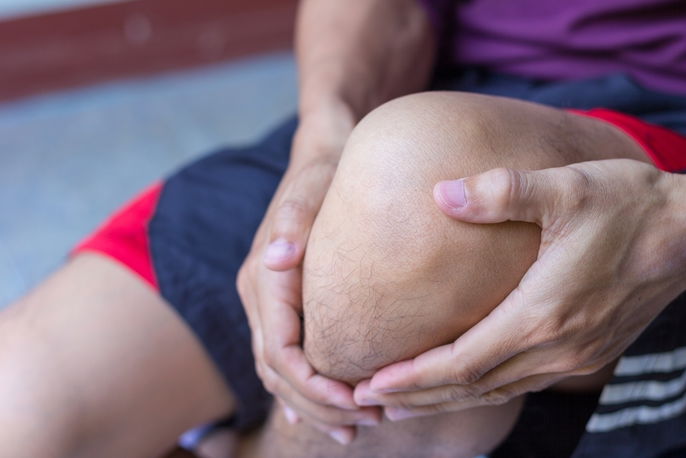Hearing cracks from your knees is a normal finding and is usually the result of synovial fluid bubbles popping, moving ligaments or increased meniscus mobility. It is usually not indicative of a health problem.
However, if your knees crack frequently, if it is noted following in an injury, or if the cracking is accompanied by other symptoms, like pain, swelling, or difficulty moving, it may be a sign of a more serious condition like a fracture or osteoarthritis.
If you suspect you may have a knee problem, particularly if you experience other symptoms, you should see an orthopedic surgeon for a thorough exam and treatment as appropriate.

What causes knee cracking?
Cracking knees are commonly caused by:
1. Normal joint movement
Many times, knee cracking can be noted with normal joint movement, due to the formation of small synovial fluid bubbles. Cracks can also be heard when moving ligaments or with increased movement of the meniscus.
In these cases, other symptoms, like pain, swelling, and difficulty moving or walking, are not experienced. The cracking is itself is not frequent and does not occur with all knee movements.
What to do: Cracking that is associated with normal joint movement does not require any specific treatment, However, if it occurs frequently, or if you do have symptoms like pain or swelling, you should see a doctor for further evaluation.
2. Excess weight
Being overweight compromises knee stability and overloads them, which can lead to cracking sounds from the knees. Many people may also notice pain with walking, exercising or light activity, like climbing stairs.
What to do: Losing weight can help to relieve pressure on the joint. You should commit to a low calorie diet as outlined by a registered dietitian, and engage in low impact exercises, like walking. Read more about how to start a weight loss diet, aswell as what to eat and avoid.
3. Misaligned body positioning
A misalignment in body positioning, even if it is microscopic, can cause imbalance in the joints and lead to cracking knees. Other joints are usually also affected as a means to compensate the pathology.
What to do: It is important to see an orthopedic surgeon to evaluate your posture and spine, hip and ankle joints. Physiotherapy utilizing the Global Posture Reeducation technique, may be indicated to work the realignment of the whole body. This technique can retrain the body to reduce load on the joints and decrease subsequent compensation from other muscles. Learn about exercises to improve posture and how to incorporate them into your fitness routine.
Exercises like pilates or swimming may also be useful.
4. Knee osteoarthritis
Cracking knees may be a one of the first signs of osteoarthritis. This condition occurs when the joint starts to break down due to incorrect form during exercise, intense activity or normal aging.
Osteoarthritis only often causes pain, however over time, it may also lead to knee swelling and stiffness, especially if left untreated.
What to do: It is important to see an orthopedic surgeon for evaluation and treatment. In initial phases of osteoarthritis, cold or hot compresses may help, as well as exercises prescribed by a physiotherapist and medications like anti-inflammatories. More serious cases may require knee replacement surgery.
5. Knee crepitus
A cracking knee may also be a sign of knee crepitus, which is a finding that is caused by normal aging, direct trauma, knee swelling, or a condition called chondromalacia patellae.
What to do: If you notice your knees cracking but do not experience any pain or limitation in movement, specific treatment is not necessary. In other cases, physiotherapy combining equipment and exercises to realign the patella can be beneficial for reducing discomfort.
6. Knee surgery
Knees that crack following surgery (like a knee replacement) may be related to factors like the prosthesis used, the surgical technique employed, and overextension of the knee in the post-operative phase.
In some situations, the cracks may occur with swelling and stiffness.
What to do: It is important to consult an orthopedic surgeon for evaluation, ideally the same on who completed the surgery, especially if you also have symptoms like pain and swelling. Further interventions, like a new surgery or arthroscopy, may be necessary.
7. Fracture
When cracking occurs after direct trauma, it may be a sign of a fracture or bones within the knee joint. In this case, patients will also report intense pain, swelling and difficulty walking after the impact.
What to do: If you suspect a knee fracture, you should proceed immediately to an emergency room for assessment and treatment.
8. Chondromalacia patellae
Chondomalacia patellae is a breakdown of the knee joint that causes symptoms like knee pain and cracks when moving the knee. This can occur due to normal aging or from being sedentary, which causes the quadricep muscles to become weakened and leads to the development of this condition.
What to do: Treatment for chrondomalacia patellae depends on the underlying cause the grade of joint breakdown. The doctor may prescribe medication, leg strengthening exercises, physiotherapy and, in more serious cases, surgery.
When to see a doctor
It is important to see a doctor or physiotherapy if your knee cracking also occurs with symptoms like:
- Knee movement, like going up or down stairs or squatting
- Redness or swelling of the knees
- Knee deformation or displacement
These symptoms may be a sign of arthritis, osteoarthritis, ligament ruptures, or ligament inflammation, which require more targeted treatment.
The doctor may advise you to avoid heavy lifting stairs, or heavy, uncomfortable shoes.
In addition, a compression sleeve over the knee may help to keep it more stable during the day. It should not be too tight or impede circulation.






























